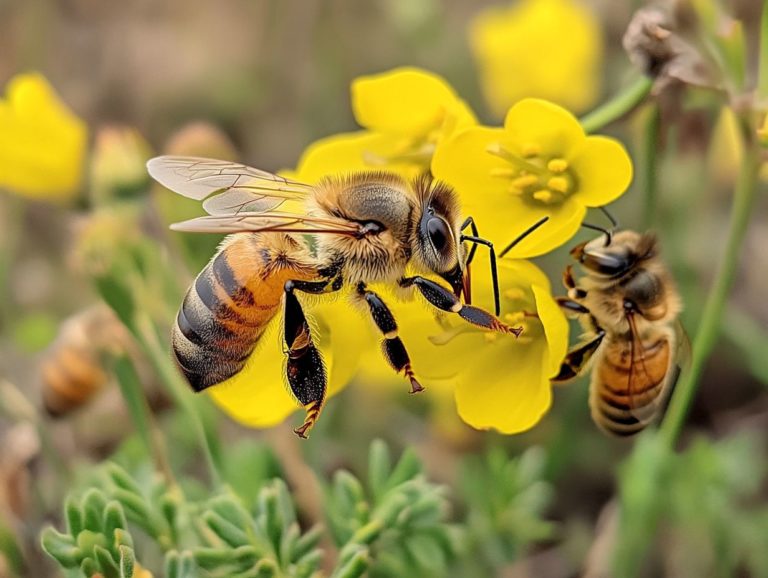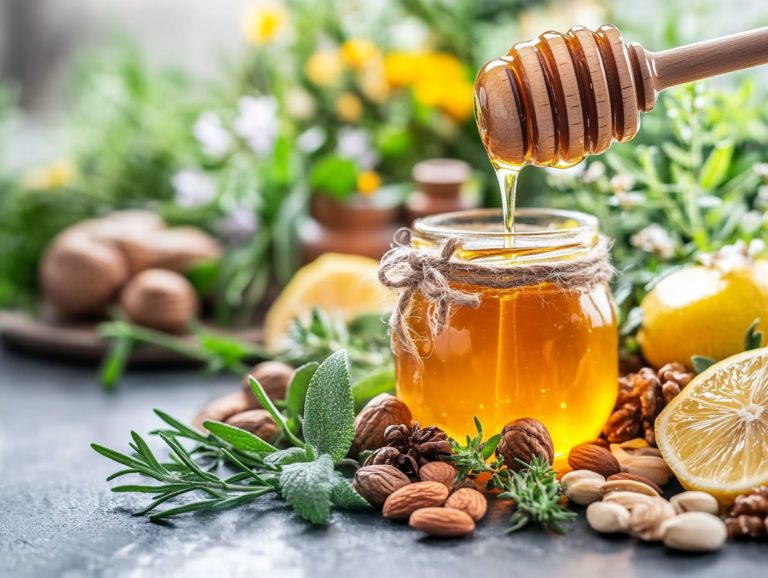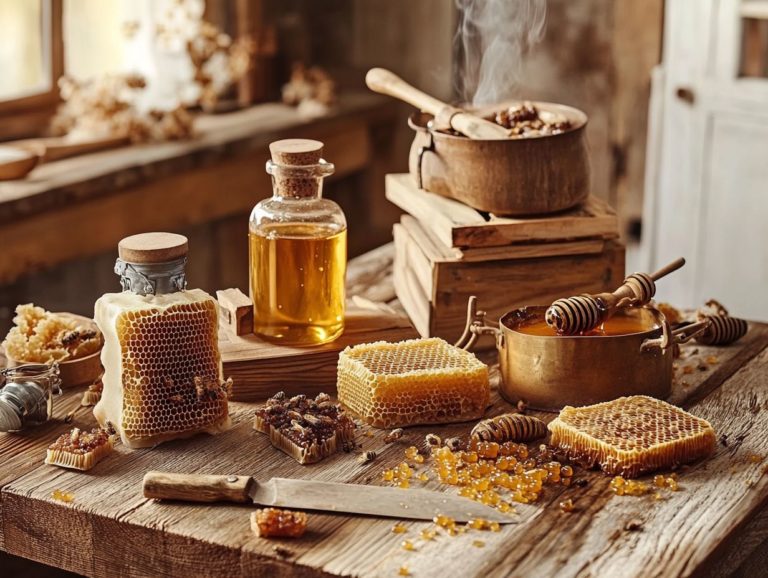5 Best Beekeeping Courses for Honey Production
Beekeeping is a rewarding and captivating pursuit that not only benefits the environment but also has the potential to be quite profitable.
This guide will delve into essential topics such as honeybee biology, effective hive management, and the art of honey harvesting. It emphasizes the importance of beekeeping courses and education, which play a crucial role in boosting honey production and ensuring you embark on your beekeeping journey with confidence.
Whether you re a passionate hobbyist, a beginner beekeeper, or aspiring to launch a business, this guide will serve as your compass in navigating the delightful realm of beekeeping.
Contents
- Key Takeaways:
- 2. Honeybee Biology and Behavior
- 3. Hive Management and Maintenance
- 4. Harvesting Honey and Other Products from Bees
- 5. Marketing and Selling Your Honey
- Why You Should Take a Beekeeping Course
- What Are the Different Types of Beekeeping Courses Available?
- How Can a Beekeeping Course Help with Honey Production?
- What Are the Key Factors to Consider When Choosing a Beekeeping Course?
- How Can a Beekeeping Course Help with Starting a Beekeeping Business?
- What Are the Common Mistakes to Avoid in Beekeeping?
- Frequently Asked Questions
- What are the top 5 beekeeping courses for honey production?
- What is the duration of these beekeeping courses?
- Do these beekeeping courses offer hands-on experience?
- Are these beekeeping courses suitable for beginners?
- Do these beekeeping courses cover topics other than honey production?
- Can I take these beekeeping courses online?
Key Takeaways:
- Learn the fundamentals of beekeeping, including the biology and behavior of honeybees, to successfully manage and maintain a hive. This includes essential hive inspection techniques and understanding the role of pollinators.
- Gain practical knowledge on harvesting honey and other bee products, as well as marketing and selling them for profit.
- Choosing the right beekeeping course can provide valuable insights and skills for starting a successful beekeeping business and avoiding common mistakes.
2. Honeybee Biology and Behavior
Bee Biology and Varroa Control
Understanding honeybee biology and behavior is essential for your success in beekeeping. These remarkable pollinators possess intricate social structures and distinctive life cycles that significantly impact hive productivity. Beekeeping education often emphasizes the importance of these factors for effective hive management.
Each honeybee colony operates as a well-organized community, consisting of three distinct castes: the queen, workers, and drones. The queen, as the sole egg-layer, is vital for the hive s sustainability. Meanwhile, industrious worker bees primarily female take on various roles, from foraging for nectar to maintaining hive hygiene and nurturing the brood.
Male drones have a singular purpose: to mate with a queen, emphasizing the delicate balance that exists within the hive. Their life cycle transitions from egg to larva to pupa, ultimately resulting in the emergence of adult bees, showcasing a remarkable efficiency that is nothing short of fascinating.
Grasping these dynamics, along with the biological importance of honey bees, is crucial for effective hive management. It also enables you to tackle pests like controlling Varroa mites, a significant threat to bee populations, ensuring the health and productivity of your hives.
3. Hive Management and Maintenance
Mastering hive management can transform your beekeeping experience! Regular inspections and sustainable practices are vital. They ensure your bee population stays healthy and your honey quality remains high.
Routine inspections allow you to detect diseases and pests early, helping you monitor the overall viability of your colony. Actively monitor key indicators of hive health, such as brood patterns which show how eggs and larvae are developing in the hive the presence of eggs, and the general behavior of your bees. These factors provide crucial insights into their well-being.
You can also employ various methods for controlling Varroa mites. Incorporating screened bottom boards is also effective, and using natural treatments can significantly mitigate these harmful pests.
By adopting sustainable practices like utilizing organic approaches and establishing mentorship programs with experienced and master beekeepers you can greatly enhance your knowledge and skill set. This fosters a community dedicated to the conservation and health of honey bee populations, enriching both your beekeeping journey and the environment. Programs like The Bee Conservancy and environmental organizations support these efforts.
4. Harvesting Honey and Other Products from Bees
Honey Extraction and Food Production
Harvesting honey and other delightful products from bees, such as mead, offers a rewarding experience. This process not only results in delicious treats but also plays an important part in local food production and sustainability efforts.
Many enthusiasts discover that beekeeping is a fulfilling pursuit, allowing them to connect with nature while actively supporting pollination and biodiversity. To embark on your honey extraction journey, you ll need some essential equipment: a bee suit, hive tool, extractor, and honey buckets. Engaging in beekeeping classes can also help you master these techniques.
The process typically begins with the careful removal of frames brimming with honeycomb from the hive. You ll uncap the honey using an uncapping knife and then utilize a centrifugal extractor a device that spins honey out of the comb to separate the honey from the comb. Beyond honey, beekeepers often relish working with other bee products, including:
- Beeswax for crafting candles or lip balms
- Propolis for health supplements
- Mead for delightful beverages
Ready to take your beekeeping skills to the next level? Join local classes or workshops, such as those offered by Cornell University or the eCornell program, to gain invaluable knowledge and hands-on experience, elevating your practice to new heights.
5. Marketing and Selling Your Honey
Marketing and selling your honey isn’t just a business skill; it’s a vital tool for beekeepers like you. It allows you to share your exceptional products with the community while championing food justice and supporting local businesses. Initiatives like the I.S 318 Project Roots and Montclair Community Farm highlight the importance of these efforts.
With the right strategies in your toolkit, you can cultivate a unique brand identity that truly resonates with consumers. Effective branding often starts with thoughtfully designed packaging that showcases the distinctive qualities and flavors of your honey, while also highlighting your sustainable practices and the crucial role of pollinators.
Storytelling can become your secret weapon, connecting customers to your product by revealing the fascinating journey from hive to jar. Exploring diverse sales avenues whether it’s local farmers’ markets, community gardens, or online platforms can greatly enhance your visibility and help you build loyal customer relationships.
Engaging with your community can help you grow your business. A strong market presence benefits not just you but strengthens the local ecosystem too.
Why You Should Take a Beekeeping Course
Taking a beekeeping course can unlock a world of benefits for you as an aspiring beekeeper. You’ll gain hands-on experience and expert knowledge while also having the chance to connect with fellow enthusiasts and professionals, including notable figures like Amanda Keene, Heather McDermott, Veronica Odom, and Satoni Zaccaro. Programs like the eCornell course and local initiatives such as Texas Roadhouse s community support offer invaluable networking opportunities.
Enrolling in such a course will arm you with practical skills in hive management, allowing you to effectively nurture and maintain bee colonies. You’ll delve into the fascinating realm of bee biology, gaining essential insights into the intricate life cycles and behaviors of these remarkable insects.
Courses that focus on sustainable beekeeping practices are becoming increasingly popular, promoting techniques that safeguard both bee health and the environment. For those just starting out, beginner-friendly options provided by local beekeeping associations often come with mentorship opportunities. This not only fosters personal growth but also encourages community engagement, enabling you to become an active contributor to the local ecosystem.
Don t miss out on this chance to learn! Join the beekeeping community today and make a difference!
What Are the Different Types of Beekeeping Courses Available?
You ll discover a diverse array of beekeeping courses tailored to your skill level and interests, ranging from online programs like the eCornell initiative to hands-on workshops that even offer scholarships for those eager to delve into agricultural education.
If you appreciate the flexibility of learning at your own pace, online courses such as the University of Georgia s offerings present a wealth of resources covering everything from hive management to the intricacies of bee biology. Alternatively, in-person workshops provide the unique opportunity for direct interaction with seasoned beekeepers, allowing you to acquire invaluable hands-on experience in real-world settings.
For beginners, specially designed classes introduce the fundamentals of beekeeping, including hive setup and maintenance. Meanwhile, advanced courses explore deeper subjects such as disease management and queen rearing. Many programs also offer financial assistance or scholarships, enabling passionate individuals like yourself to enhance your skills and knowledge in the fascinating world of apiculture. Institutions like IUPUI and Colorado Rocky Mountain School offer scholarships for agricultural education.
How Can a Beekeeping Course Help with Honey Production?
A beekeeping course can significantly elevate your honey production skills by imparting essential techniques such as hive inspection, pest management, and sustainable practices that directly influence both the quality and quantity of honey you harvest. Beekeeping scholarships offered by educational organizations can make it easier to access these courses.
Through hands-on learning, you will develop the ability to monitor bee health, identify signs of disease, and implement timely interventions. This knowledge is invaluable for maintaining healthy bee colonies, which are essential for achieving optimal honey yields.
Adopting best practices in hive management like conducting regular inspections and strategically placing your hives in pollinator-friendly areas, such as community gardens can dramatically enhance the bees’ foraging efficiency.
Moreover, employing effective pest control methods, including organic treatments and thoughtful habitat management, will further alleviate stress on your colonies. This not only boosts honey production but also supports the sustainability of your beekeeping endeavors.
What Are the Key Factors to Consider When Choosing a Beekeeping Course?
When selecting a beekeeping course, consider several key factors that will greatly influence your learning journey. Pay attention to the experience of the instructors, the depth of the course curriculum, and the opportunities for community engagement that can enrich your educational experience. Beekeeping education from accredited institutions like Cornell University or the eCornell program can offer exemplary guidance.
Additionally, don’t overlook the importance of hands-on training; it s essential for applying theoretical knowledge in real-world scenarios. Access to seasoned mentors, including master beekeepers, can significantly elevate your learning, providing personalized guidance and invaluable insights based on their own experiences. Building connections with local beekeeping communities and community gardens enhances this journey, offering a supportive network that encourages ongoing learning and resource sharing well beyond the course.
Together, these elements create a comprehensive and immersive experience, equipping you with the skills and confidence needed to excel in your beekeeping endeavors.
How Can a Beekeeping Course Help with Starting a Beekeeping Business?
Enrolling in a beekeeping course can be a transformative step in establishing a successful beekeeping business, equipping you with invaluable insights into best practices, marketing strategies, and sustainable methods that resonate with environmentally conscious consumers. Specialized programs like the eCornell program or beekeeping scholarships through organizations such as The Bee Conservancy can provide additional benefits.
Through these courses, you gain a deep understanding of essential market trends that shape consumer behavior, enabling you to identify and effectively target niche markets. The curriculum often encompasses product diversification techniques, enabling you to expand your offerings beyond traditional honey to include beeswax, propolis, and pollen, thereby enhancing your revenue streams. Understanding pollinators and the role of honey bees in food production can also be a key component.
As an aspiring beekeeper, you’ll also discover effective marketing techniques tailored to your local community think engaging with farmers’ markets or utilizing the strength of social media. Collaborations with local organizations like Montclair Community Farm or Texas Roadhouse could also prove beneficial. These are critical tools for building brand recognition and fostering customer loyalty in an increasingly competitive landscape.
What Are the Common Mistakes to Avoid in Beekeeping?
As a new beekeeper, you may find yourself facing several common mistakes that could jeopardize the health and productivity of your hive. Issues like poor hive management, inadequate pest control, and failing to seek guidance from educational organizations can occur. For instance, not performing regular hive inspections or overlooking varroa control measures can be detrimental.
These challenges can result in significant losses, highlighting the importance of being well-prepared before you immerse yourself in the intricate world of beekeeping. It’s easy to overlook the necessity of regular inspections or misidentify pests, such as the Varroa mite, which can ultimately compromise your bees’ immune systems.
To elevate your skills and knowledge, consider actively participating in local beekeeping clubs or workshops. Connecting with experienced mentors can offer invaluable insights and help you sidestep common pitfalls, ensuring that your efforts lead to thriving colonies and the sweet rewards of honey production.
Frequently Asked Questions
What are the top 5 beekeeping courses for honey production?
The top 5 beekeeping courses for honey production are: Beekeeping for Beginners, Advanced Beekeeping Techniques, Honey Harvesting and Processing, Sustainable Beekeeping Practices, and Hive Management for Maximum Honey Production. These courses are often endorsed by industry experts such as Amanda Keene and Heather McDermott.
What is the duration of these beekeeping courses?
The duration of these beekeeping courses vary, but on average they range from 6-12 weeks. However, some courses may be shorter or longer depending on the level of depth and intensity of the curriculum. Programs at institutions like Colorado Rocky Mountain School or IUPUI offer different timelines.
Do these beekeeping courses offer hands-on experience?
Yes, all of these courses offer hands-on experience to provide a comprehensive learning experience. Some courses may include on-site visits to local bee farms or hands-on learning activities during class sessions. Engaging with programs run by experts like Veronica Odom or Satoni Zaccaro can also be highly beneficial.
Are these beekeeping courses suitable for beginners?
Yes, these courses are suitable for beginners as well as more advanced beekeepers. They cover a wide range of topics and cater to different levels of experience. Beginner beekeepers will find foundational knowledge, while advanced participants can delve into complex areas like bee biology and honey extraction.
Do these beekeeping courses cover topics other than honey production?
Yes, while the main focus of these courses is honey production, they also cover other important topics such as hive management, bee health, and sustainable beekeeping practices. This provides a well-rounded education for aspiring beekeepers. Courses often emphasize environmental stewardship and food justice as key elements.
Can I take these beekeeping courses online?
Yes, most of these courses offer online options for learning from home. Some courses may also provide in-person classes for those who enjoy hands-on experiences.
Check with the specific course provider for their available options. Platforms like Google LLC often host webinars that enhance your learning experience.



